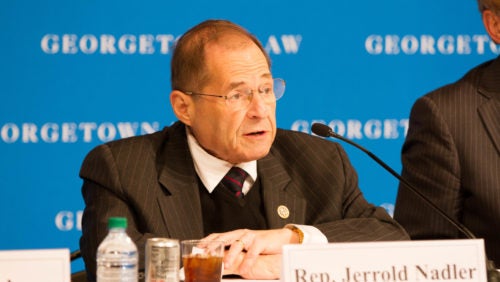Congressional Oversight of the DOJ and FBI in the Trump Era
April 20, 2018

House Judiciary Committee Ranking Member Jerrold Nadler (D-NY) speaks at a forum convened by Georgetown Law's Center for Congressional Studies on April 19.
Administrations of both parties have traditionally kept the Department of Justice at arm’s length, allowing investigations and prosecutions to run their course without political interference.
President Donald Trump, though, has critiqued and commented upon the Department of Justice and FBI, their leadership and ongoing criminal and counterintelligence matters in unprecedented ways.
On Thursday, April 19, Georgetown Law’s Center for Congressional Studies convened a forum featuring House Judiciary Committee Ranking Member Jerrold Nadler (D-NY), former Rep. Tom Davis (R-Va.), Rep. John Sarbanes (D-Md.), bipartisan experts and scholars to discuss the president’s break from the practices of his predecessors; and the role of congressional oversight in ensuring an independent DOJ and FBI.
“Oversight of the Department of Justice and the FBI is incredibly important…” Nadler said, adding that there are few tasks in our government more critical than ensuring the fair and impartial administration of justice. “We live in a time when both the DOJ and the FBI are under attack by the president and the congressional majority…this assault has been aided and abetted by the majority in Congress.”
Nadler called for Congress to pass the Special Counsel Independence and Integrity Act; to return to “regular order” on oversight; to have committee vote on subpoenas; to limit hypothetical assertions of executive privilege; and to enforce rules limiting communications between the White House and DOJ.
Georgetown Law Professor Victoria Nourse, director of Georgetown Law’s Center on Congressional Studies and former counsel to Vice President Joe Biden, moderated the discussion. The panel also featured Professor David Vladeck, faculty director of Georgetown Law’s Center on Privacy and Technology who is an expert on litigation involving minority party rights in the House; and Visiting Professor Mary McCord (L’90) of Georgetown Law’s Institute for Constitutional Advocacy and Protection.
McCord, who served as former acting assistant attorney general and principal Deputy Assistant Attorney General for National Security until 2017, expressed concern with the president’s relationship with the Department of Justice and FBI.
“Whether it’s through the Tweets, the public statements, or comments of surrogates…his own views of the authority that he would like to have…over the Department in terms of actually playing a role in individual investigations — which investigations should be started, which investigations should be ended — that’s not normal,” she said, noting that every administration since Watergate has had strict rules and policies that govern the exchange of information between the White House and the Department of Justice.
While it is perfectly appropriate for the president to look to his political appointees at the Justice Department to carry out policy changes, guidelines strictly constrain communications between the White House and the DOJ and FBI with respect to specific investigations, McCord said. “That’s for good reason.”
The panel also included Bruce Fein, former associate deputy attorney general during the Reagan Administration; and Josh Campbell, former special assistant to the FBI director.
Georgetown Law Professor David Vladeck explored structural issues of oversight, noting that checks and balances are vital to our constitutional scheme. “We need to think hard about oversight,” Vladeck said, “and how it’s taking place these days.”